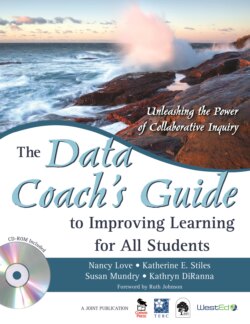Читать книгу The Data Coach's Guide to Improving Learning for All Students - Katherine E. Stiles - Страница 12
На сайте Литреса книга снята с продажи.
Purpose of the Book
ОглавлениеOur first driving purpose for this book is to contribute to dramatic and permanent improvement in the way schools go about their business so that they make a greater positive difference in students’ lives. Through a combination of information (skill building and knowledge) and inspiration (will building), we intend for this book to guide educational leaders in unleashing the power of collaborative inquiry to improve schools.
What ignites the Using Data Process is will—the appetite, passion, choice, and determination to serve every child as if he or she were our own, a mindfulness of the awesome influence we have in the students’ lives that we touch, and a commitment to use that influence to produce the best possible results for every one of them. So a second purpose of this book is to strengthen your resolve and the resolve of others with whom you work to do whatever it takes to educate every student to the peak of his or her capacities. We provide tools and processes for opening up dialogue about the assumptions that underlie interpretations of the data, gaining clarity about the Data Team’s vision and purpose, shifting conversations away from blame and toward possibility, and staying focused on what is most important—the actions we can take to improve students’ learning and the quality of their lives.
Author and cultural proficiency expert Franklin CampbellJones says, “Get ethical before you get technical” (personal communication, December 10, 2005). This book intends to do both. “School improvement” without will and moral purpose—without a genuine commitment to all students—is an empty exercise in compliance that, in our experience, can do more harm than good. The authors have seen educators use data to “more accurately” track students, further widening the opportunity-to-learn gap. In response to achievement gaps, one school mandated lunchtime tutoring for all African American students—regardless of whether or not they failed the state test (Confrey & Makar, 2005). Avoiding these and other data-based disasters is not a technical matter. It is an ethical matter that begins with will, passion, and determination.
Our third purpose is to “get technical”—to build skills and knowledge about how to lead a process of collaborative inquiry with school-based Data Teams and to influence the culture of schools to be one in which data are used continuously, collaboratively, and effectively to improve teaching and learning. In the last few years, educators have been called upon to do work they have never done before and were, in most cases, never prepared to do, including
work productively in professional learning communities,
apply principles of cultural proficiency to data use and school improvement,
understand and draw sound inferences from a variety of different kinds of data,
accurately identify root causes of problems the data surface,
implement research-based instructional improvements linked to goals, and
monitor interim and long-term progress toward goals.
This book addresses this capacity crisis by providing you with detailed and technical guidance in how to engage in systematic and continuous improvement. You will learn how to move schools away from unproductive data practices and toward high-capacity uses of data that are built on a strong foundation of data literacy and collaborative inquiry knowledge, skills, and dispositions as well as a spiritual and moral commitment to serve each and every student.
